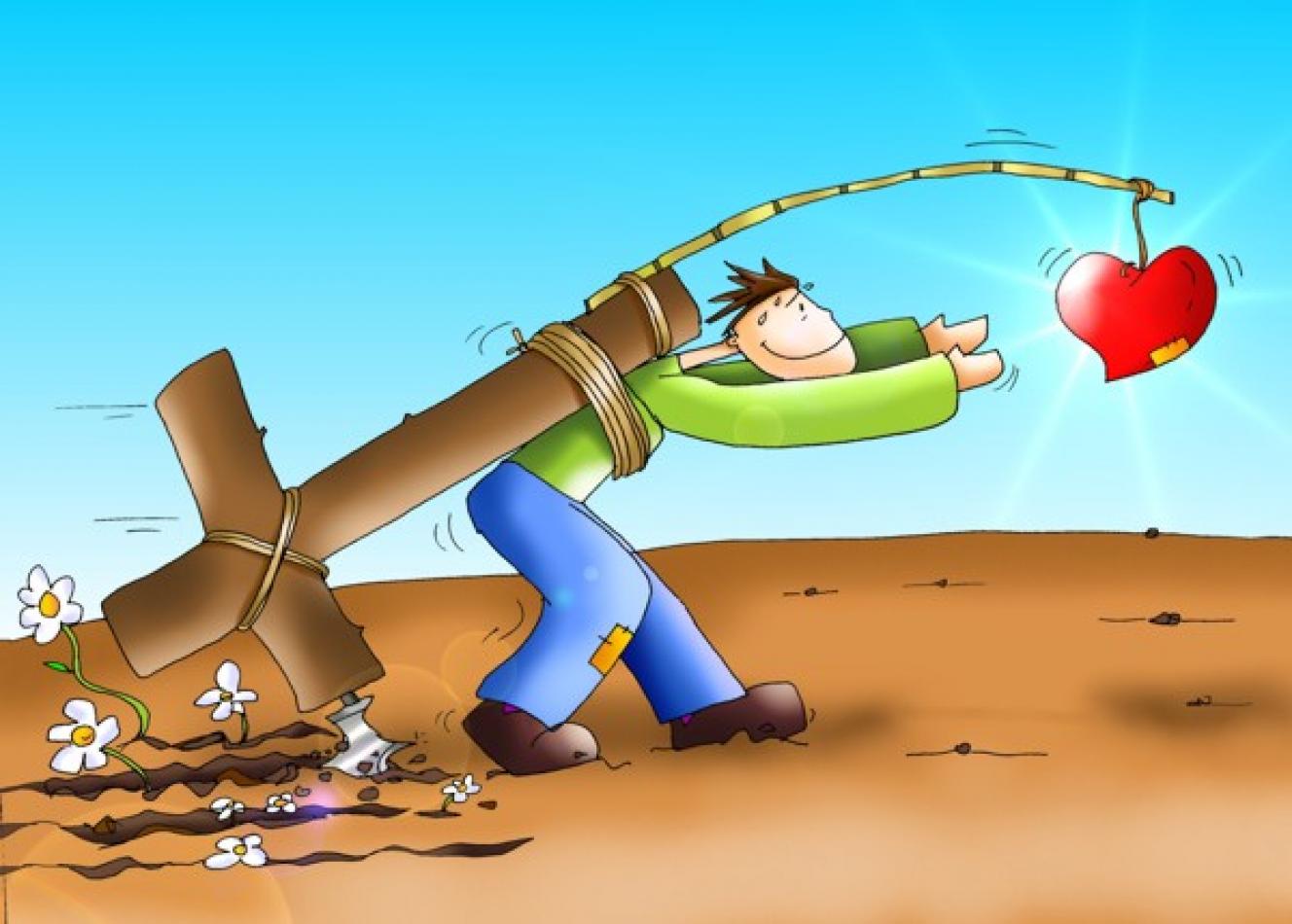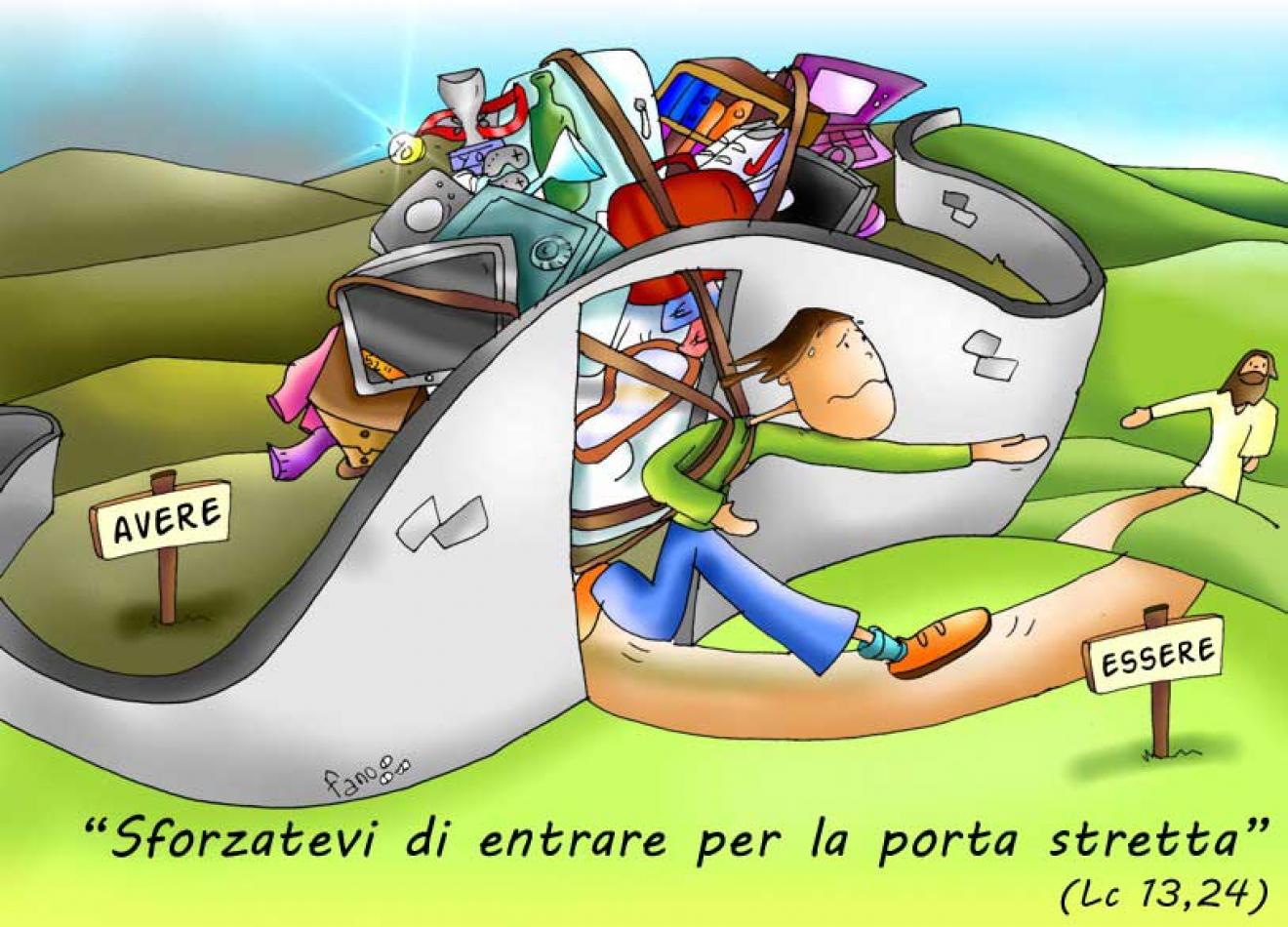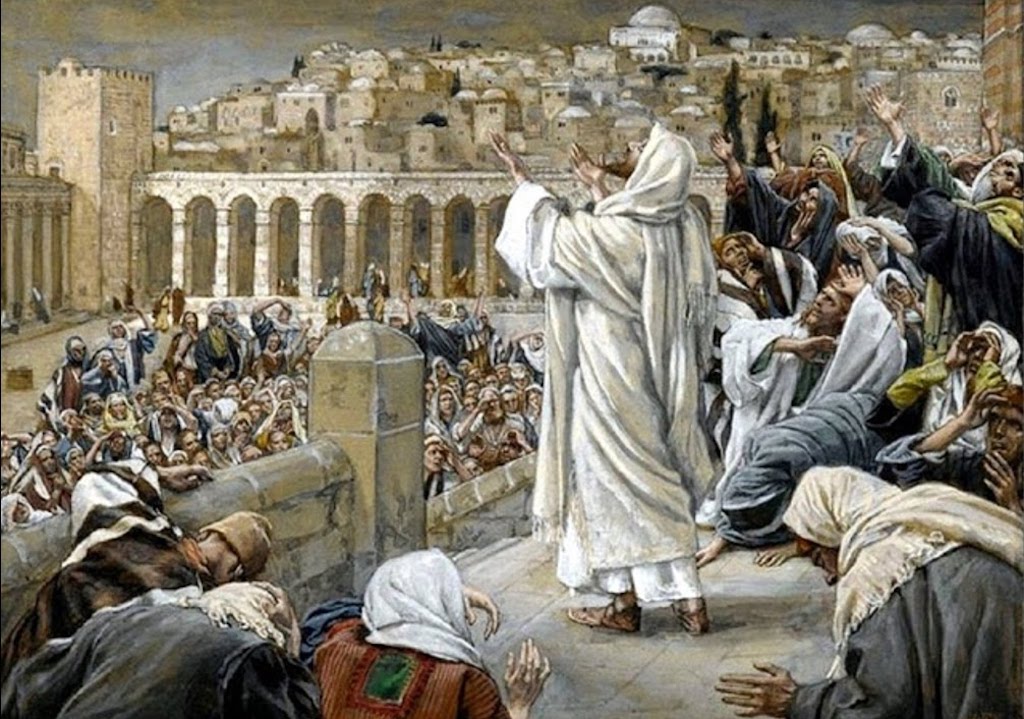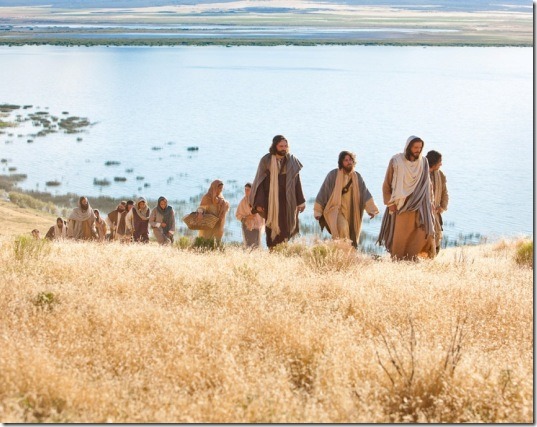Daniel Comboni
Comboni Missionaries
Institutional area
Other links
Newsletter
The examples Jesus uses may be multiple, but his teaching is the same: the one who begins an important project rashly, without studying ahead of time if he has the means and the energy to accomplish what he intends, runs the risk of ending up with a disaster on his hands.
Luke 14: 25-33
RESPONSIBLE REALISM
by José Antonio Pagola
Readings: Wisdom 9:13-18b; Philemon 9b-10, 12-17; Luke 14:25-33
The examples Jesus uses may be multiple, but his teaching is the same: the one who begins an important project rashly, without studying ahead of time if he has the means and the energy to accomplish what he intends, runs the risk of ending up with a disaster on his hands.
No builder plans on constructing a tower in order to protect his vineyard, without first taking the time to calculate if he can finish it successfully, or else the project remains unfinished, provoking his neighbors’ ridicule. No ruler decides to enter into combat with a powerful enemy, without first analyzing if that battle can end in victory or if it would be suicide.
At first look, it could seem that Jesus is inviting us to a prudent and cautious behavior, far from the boldness with which he ordinarily speaks to his disciples. Nothing could be further from reality. The mission that he wants to commend to his followers is so important that no one should commit self to it in an unconscious, fearful or presumptuous way.
His warning covers a lot of area in these critical and decisive times concerning the future of our faith. Jesus calls, above all, to a mature reflection: the two protagonists of the parables «sit down» to reflect. It would be a grave irresponsibility to live today as disciples of Jesus who don’t know what they want, or where they hope to get to, or by what means they should be working.
When are we going to sit ourselves down to gather our energies, reflect together and seek out the path we should all be following? Don’t we need to dedicate more time, more listening of the Gospel and more meditation in order to discover God’s call, awaken charisms, cultivate a renewed style of following Jesus?
Jesus also calls us to realism. We are living through an unprecedented socio-cultural change. Is it possible to spread faith in this new world that is being born, without knowing it well or without understanding it from within? Is it possible to facilitate access to the Gospel by ignoring the thinking, feelings and language of men and women of our times? Isn’t it wrong to respond to today’s challenges with yesterday’s strategies?
It would be reckless in these times to act unconsciously or blindly. We’d be exposing ourselves to disaster, frustration, even ridicule. According to the parable, the «unfinished tower» does nothing except provoke mockery by the people toward its builder. We mustn’t forget Jesus’ realistic and humble language that invites his disciples to be «leaven» in the midst of the people, or a pinch of«salt» that give new flavor to people’s lives.
Translator: Fr. Jay VonHandorf
https://www.feadulta.com
IF ANYONE FOLLOWS ME …
Fr. Raniero Cantalamessa
The Gospel reading for today is one of those that we would be tempted to smooth out and sweeten because it seems too hard for men of today: “If anyone follows me without hating his father, his mother.”
Let us immediately make one thing clear: It is true that the Gospel is sometimes provocative, but it is never contradictory. A little further on in the same Gospel of Luke Jesus firmly re-emphasizes the duty of honoring father and mother (Luke 18:20), and in regard to husband and wife he says that they must be one flesh and that man does not have a right to separate that which God has joined together. How, then, can he tell us to hate father and mother, wife, children, brothers and sisters?
We need to keep in mind a certain fact. The Hebrew language does not have comparatives — it is not possible in Hebrew, for example, to speak of loving something “more” or “less” than another thing. It is only possible to speak of loving or hating. The phrase, “If anyone follows me and does not hate father and mother” should be understood in this way: “If anyone follows me, without preferring me to father and mother.” To see that this is so we only need to look at the same matter in the Gospel of Matthew where Jesus says: “Whoever loved father and mother more than me is not worthy of me” (Matthew 10:37).
It would be a big mistake to think that this love for Christ enters into competition with the different human loves: for parents, husband and wife, children, brothers and sisters. Christ is no one’s rival in love and he is not jealous of anyone.
In Paul Claudel’s play “The Satin Slipper,” the female protagonist, a fervent Christian, who is deeply in love with Rodrigo, exclaims to herself, almost finding it hard to believe: “Is it permitted, then, this love between creatures? Truly, God is not jealous?” And her guardian angel answers: “How could he be jealous of what he himself has made?” (Act 3, Scene 8).
Love for Christ does not exclude the other loves, but rather orders them. Indeed, it is in him that every genuine love finds its foundation and support and the necessary grace to be fully lived out. This is the meaning of the “grace of state” that the sacrament of marriage confers to Christian husbands and wives. It assures that in their love they will be sustained and guided by the love that Christ had for his Church.
Jesus does not disappoint nor deceive anyone; he asks everything because he wants to give everything; indeed, he has given everything. Someone might ask themselves: “But what right does this man have, who lived 20 centuries ago in an obscure corner of the world, to ask this absolute love of everyone? We do not need to look too far to find the answer, which is in his earthly life about which history tells us: It is because he first gave everything for man. “He loved us and gave himself up for us” (cf. Ephesians 5:2).
In the same Gospel Jesus reminds us what the benchmark and sign is of true love for him: “taking up your own cross.” Taking up our own cross does not mean seeking out suffering.
Jesus did not seek out his cross; he took on himself in obedience to the Father what men put on his shoulders and with his obedient love transformed it from an instrument of torture into a sign of redemption and glory.
Jesus did not come to make human crosses heavier, but rather to give them meaning. It has been rightly said that “whoever looks for Jesus without the cross will find the cross without Jesus,” that is, he will certainly find the cross but not the strength to carry it.
http://www.zenit.org
The Cross: A disgrace becomes a sign of glory
Fernando Armellini
Introduction
The saying of a desert father is famous: “The time will come when men will go crazy. And in seeing someone who is not mad they will pounce on him saying, ‘You’re crazy!’, because of his dissimilarity from them.” Paul has been through this experience: “The Jews ask for miracles and the Greeks for a higher knowledge, while we proclaim a crucified Messiah. For the Jews, what a real scandal. And for the Greeks, what nonsense!” (1 Cor 1:22-23). Where is true wisdom? The logic of the cross is not that of the world. Man is born and grows to assimilate that of the world. When the “folly of the cross” was announced to him as normal and the outcome even healthy, he is seized with doubts and misgivings and he sits down to reflect on the choice to make.
We search for life, not death. We want to avoid what makes us suffer and the cross, unfortunately, does not evoke the idea of salvation. Certain forms of mortification, penance, and ascetic practices have not made a good service to the understanding of the call made by Jesus to take the cross.
The Christian does not aspire to pain (even Jesus did not seek it), but love. However, when love is “lived up to the end” (Jn 13:1) it comes to the gift of life.
That’s why the cross, from a sign of death, becomes a symbol of life.
Until the end of the 3rd century, the Christian symbols were the anchor, the fisherman, the fish but never the cross. It will only be from the 4th century, with the famous discovery of the instrument of execution of Jesus by St. Helena, that the cross will become the symbol of victory, not on the enemies of Constantine at the Milvio Bridge but on death and all those that cause death. To choose the cross is to choose life. But it is not easy to understand.
Gospel Reflection
In the religious field, statistics, percentages, projections, readings are useful if they help to reflect on one’s own responsibility and stimulate to examine ecclesial choices in the light of the Gospel. They are questionable and biased when instead they lead to download all the faults and failures on hedonism, laicism, and secularism. They are even deleterious if they lead to interpreting the increase of followers as a source of pride, vanity, self-satisfaction.
Faced with “large numbers”, the “immense crowds” Jesus worries, instead of rejoicing. He imagines his disciples as a “little flock” (Lk 12:32), as a bit of “salt” (Mt 5:13) or of “ferment” (Mt 13:33), as “a mustard seed” (Mt 13:31). We should not be surprised if—as is the case in today’s Gospel—he is amazed to see that “large crowds were walking along with him” (v. 25). And he is seized by doubt that there was a misunderstanding, that the crowds have misunderstood his words. He turns and begins to explain what is involved in the choice to be his disciples (v. 25).
Jesus makes three very hard requests, that end with the same severe refrain: cannot be my disciple! (vv. 26,27,33). It almost seems that he wants to keep people away rather than attract them. The passage was often applied to the monastic vocation. It is actually directed to the crowds that go with him, is aimed at those who want to be Christians.
We begin with a clarification: If you come to me—says Jesus—not “if one wants to come after me” (v. 26). The difference is subtle but significant because it reveals the intention of the evangelist. Luke wants to address the words of Jesus to the many converts of his communities who are attracted by the Master, feel sympathy for him and his message but are also tempted to “tame” the Gospel, to make it more negotiable.
The conditions that Jesus places are clear and are not negotiable.
The first: “If you come to me, unwilling to sacrifice your love for your father and mother, your spouse and children, your brothers and sisters, and indeed yourself, you cannot be my disciple.” (v. 26).
When he presents the requirements of the Christian vocation, Jesus always uses very strong images. He does not want anyone to get illusions. We heard him a few Sundays ago declaring to those who wanted to follow him: “Foxes have holes and the birds of the air have nests, but the Son of Man has nowhere to lay his head… Let the dead bury their dead” (Lk 9:57-62). On another occasion, he spoke of the need to gouge the eye and cut the hand and foot than scandalize people (Mk 9:43-47). However, he never came to claim that it is a must to hate one’s own family and even one’s own life. How is it possible? The Christian is one who loves everyone, even the enemies.
Someone solves the difficulty by arguing that, in the language of Jesus, the word to hate also means “to love less”, “to put in second place”. It’s true, but perhaps this is not the right solution. First, love has no limits and the more one loves, the better. God is not jealous and considers as addressed to him all the love given to persons (Mt 25:40). There’s no need to be afraid to exaggerate. Besides, to reduce the severe words of the Master to a simple question of quantity: “to love more—to love less” means not understand them.
When Jesus speaks of hate, he refers to the clean cuts one needs to do when it comes to staying faithful to the Gospel. To hate is to have the courage to break even the most loved bonds when they constitute an impediment to following him. It is the invitation to the Christians of the communities of Luke to dissociate, to oppose in every way what is contrary to the Gospel, even when it means to go in disagreement with a friend, offend the sensibilities of some family, giving up choices of compromise. These detachments, these positions can be classified as “hate”, but they are courageous gestures of genuine love.
The second condition: “Whoever does not follow me, carrying his own cross, cannot be my disciple” (v. 27).
This phrase is often interpreted as a call to patiently bear adversities, small or great sufferings of life. Other times it is understood as a call to mortify, to make sacrifices.
Jesus does not make a request for resignation, but of willingness to testify one’s own faith, even with one’s life. Martyrdom is a possibility to take into account for the proposal of new life—that of the Beatitudes—is shocking and triggers reactions. Who does not understand or consider it dangerous for good social or religious order, will certainly appeal to some form of violence. Maybe it will be just verbal abuse (insults, slanders, defamations, ridicules), but can manifest itself in discrimination, social or religious marginalization, in the ban. It can even result to physical violence, as it happened with Jesus.
This is the cross that the disciple has to expect.
Before introducing the third request, Jesus tells two short parables. The first is about a man who, wanting to protect the harvest from thieves and animals, decided to build a tower in his field to put a guard. He does not start work without having first calculated the amount needed to complete the work. It goes up to his reputation (vv. 28-30).
The second parable tells of a king who wants to start a war. He also sits down and evaluates the forces of his army (vv. 31-32). There was a saying: before going to hunt lions, take your spear and stick it to the ground. If you cannot make it penetrate deeply, give up your project: the lions are too strong for you!
The two parables seem an invitation to renounce the Christian vocation. In fact, the goal is to remind of the seriousness and commitment that this choice entails.
Who has heard the Gospel cannot illude himself of being already a disciple? The impulses and the initial enthusiasm are not sufficient, constancy and strength are necessary to persevere.
The third condition: “None of you may become my disciple if he doesn’t give up everything he has” (v. 33).
It is not about giving a few coins as alms. One has to give up everything. It is not a joke!
To make this request feasible an unhappy solution was devised. They started to talk about institutes of perfection (religious, monks, nuns) who—taking the vows—undertake to fully practice what Jesus demands. The simple Christians can instead continue to own and administer their assets, but they must resign themselves to being imperfect Christians. In short, the renunciation of goods would not be a precept for all, it would be one more proposal to some heroes, committed to practice also the “optional” parts of the Gospel.
It is a clumsy trick. The demand for total detachment from assets is not addressed only to some, but to everyone who comes to Jesus. Lest any doubts arise, Luke several times referred to this condition laid down by the Master (Lk 12:33; 18:22…).
It is not easy to forward concrete proposals. Luke presented in the Acts the community in which no one was poor because they had all pooled their property (Acts 2:44-45; 4:32-35). Certainly, the decision to follow Christ involves a completely new relationship even against the goods of this world.
Fernando Armellini
Italian missionary and biblical scholar
https://sundaycommentaries.wordpress.com






